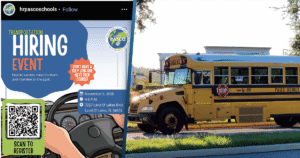By Matt Wiley
High school is a time of figuring out what’s next. Some students decide to go away (or stay close to home) for college, while others decide to enter a trade and hope to begin making money as soon as they receive their diplomas.
For these students, specifically those with a passion for pistons, the Wesley Chapel High (WCH) Academy of Automotive Service Technology’s new mechanic shop is a perfect place to learn the skills needed to be a successful professional in the automotive industry, without having to leave the Wells Rd. campus.
The $1.5-million, 6,300-sq.-ft. shop, paid for entirely by the Pasco County School District (PCSD), opened just before Christmas break. Following more than six months of construction, students finally were able to get to work in the shop.
“When the kids got back from winter break, they were able to hit the ground running,” says WCH teacher Jason Hallman, who took over the program in 2010. “They were actually able to start working on vehicles and we became an actual operating auto shop at that point.”
However, before the shop, and before Hallman took over, the learning was much less hands-on — quite the opposite from what classes are like now. When he arrived at WCH, Hallman found an auto program that was being taught completely on computers and from textbooks.
“The first thing I did was get the tools out and put the textbooks away,” Hallman explains. “We took the kids out to a carport in the parking lot and started introducing them to the different tools and parts of a vehicle. Learning how to properly wash a vehicle was their first hands-on experience. If you can wash a vehicle (properly), you can get a job washing cars.”
Prior to taking over as head instructor for the program, Hallman worked for 23 years in the auto industry, and owned a few shops of his own, as well as running shops owned by others. He says that his experience has helped shape the program.
Before Hallman arrived, there were just under 100 students enrolled in the WCH Academy. Last year, he says, the response was overwhelming. More than 185 applications were submitted to fill 144 spots. Next year, the program is looking to increase enrollment to about 200. Due to the response, fellow instructor Jeff Corliss was brought on to assist Hallman.
Each student in the program has the same required curriculum, but Hallman says that he and Corliss try to cultivate students’ respective skills. If a student is better with social interactions, they make sure the student is greeting customers and doing service write-ups. If a student learns and works better hands-on, they put tools in the student’s hands first.
The program isn’t for the faint of heart or those just looking for an elective, as it requires a commitment of all four years. Unfortunately, anyone else who applies for the program, Hallman says, is difficult to accept because there are students who truly want to make a career in the industry and would benefit much more than a student just looking for another class to take.
“It’s not an industrial arts class,” Hallman says. “It’s a working auto academy. So, we prepare the kids for real-life, everyday experiences. We focus on the basic skills with repetition and use those two things to build strong, entry-level mechanics and automotive professionals.”
The most common procedures students perform include oil changes, tire rotations and balancing, air-conditioning recharges, vehicle detailing and diagnosis. However, these procedures are only done to vehicles on campus.
“We are never going to compete with our stakeholders,” Hallman explains. “I don’t want to compete with any shop that could potentially give one of my students a job. We only work on cars at the school.”
Hallman says that teaching the diagnosis process is perfect because the students can diagnose and make repair recommendations to a teacher or classmate who then can go and get it repaired locally. Someday, the students in the class could be the ones at a local dealership, such as the numerous car lots on S.R. 54, that then fix the problem for that teacher.
Hallman says that most of his seniors this year are going into vocational careers or the military, where the skills learned in the academy will be extremely beneficial.
“You have to have a passion for automobiles,” Hallman explains. “If you have that passion, I will find a skill that you can be successful at, market and make into your profession.”
For more information about the WCH Academy of Automotive Technology, please visit WCHS.Pasco.K12.US.




No comment yet, add your voice below!